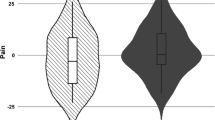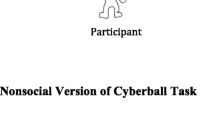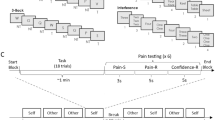Abstract
In this study we show that experiencing physical pain interacts with justice related cognition and serves to reduce justice-restoring behavior in the context of interpersonal moral transgressions. This is because concepts of punishment and justice are embodied within the experience of pain, allowing for a sense of atonement from one’s wrongdoings. Two thirds of the participants were induced to feel that their performance in a two player game was unfair. Half of those participants were then asked to engage in a physically painful task, and were afterwards less likely to make amends for past poor performance compared to players who completed a similar, but non-painful task. This effect was only evident for participants who are particularly sensitive to personal injustices and therefore sensitive to the justice restoring qualities of pain.

Similar content being viewed by others
Notes
The performance task was pretested to ensure that the bogus-feedback was believable. The letters were only briefly presented, and during that brief moment participants were focused on the keyboard to search for the correct key, therefore, it was difficult to determine whether one had hit the correct key on time or not. This made the (difference in) bogus-feedback believable.
Other measures included in the questionnaire-packet focused on bodily sensitivity, i.e., the private body consciousness subscale of the self-consciousness inventory (Fenigstein et al. 1975) and the Highly Sensitive Person Scale (HSPS; Aron and Aron 1997), also the Just World-Scale (Rubin and Peplau 1975) was included. We did not have clear hypotheses about these measures, nor were these measures relevant for the hypotheses underlying the present study.
This cooks distance was calculated from regressing the interaction term onto the dependent variable. When this case was included the interaction effect of justice sensitivity and condition in predicting reparation behavior was not significant (β = −35, p = .11).
References
Adams, J. S. (1963). Towards an understanding of inequity. The Journal of Abnormal and Social Psychology, 67, 422–436.
Adams, J. S. (1965). Inequity in social exchange. Advances in Experimental Social Psychology, 2, 267–299.
Aron, E. N., & Aron, A. (1997). Sensory-processing sensitivity and its relation to introversion and emotionality. Journal of Personality and Social Psychology, 73, 345–368.
Bastian, B., Jetten, J., & Fasoli, F. (2011). Cleansing the soul by hurting the flesh: The guilt reducing effect of pain. Psychological Science, 22, 334–335.
Bastian, B., Jetten, J., & Stewart, E. (2013). Physical pain and guilty pleasures. Social Psychological and Personality Science, 4, 215–219.
Baumeister, R. F., Stillwell, A. M., & Heatherton, T. F. (1994). Guilt: An interpersonal approach. Psychological Bulletin, 115, 243–267.
Caplovitz-Barrett, K. (1995). A functionalist approach to shame and guilt. In J. P. Tangney & K. W. Fischer (Eds.), Self-conscious emotions: The psychology of shame, guilt, embarrassment, and pride (pp. 25–63). New York: The Guilford Press.
Craft, L. L., & Landers, D. M. (1998). The effect of exercise on clinical depression and depression resulting from mental illness: A meta-analysis. Journal of Sport & Exercise Psychology, 20, 339–357.
Darley, J. M., & Pittman, T. S. (2003). The psychology of compensatory and retributive justice. Personality and Social Psychology Review, 7, 324–336.
De Hooge, I. E., Nelissen, R. M. A., Breugelmans, S. M., & Zeelenberg, M. (2011). What is moral about guilt? Acting prosocially at the disadvantage of others. Journal of Personality and Social Psychology, 100, 462–473. doi:10.1037/a0021459.
De Hooge, I. E., Zeelenberg, M., & Breugelmans, S. M. (2007). Moral sentiments and cooperation: Differential influences of shame and guilt. Cognition and Emotion, 21, 1025–1042.
Fenigstein, A., Scheier, M., & Buss, A. H. (1975). Public and private self-consciousness: Assessment and theory. Journal of Consulting and Clinical Psychology, 43, 522–527.
Freud, S. (1916/1957). Some character-types met with in psycho-analytic work. In J. Strachey (Ed.), The standard ed. of the complete psychological works of Sigmund Freud (Vol. 14, pp. 309–336). London: Hogarth Press.
Inbar, Y., Pizzaro, D. A., Gilovich, T., & Ariely, D. (2013). Moral masochism: On the connection between guilt and self-punishment. Emotion, 13, 14–18.
Mohiyeddini, C., & Schmitt, M. J. (1997). Sensitivity to befallen injustice and reactions to unfair treatment in a laboratory situation. Social Justice Research, 10, 333–353.
Nelissen, R. M. A. (2012). Guilt induced self-punishment as a sign of remorse. Social Psychological & Personality Science, 3, 139–144.
Nelissen, R. M. A., & Zeelenberg, M. (2009). When guilt evokes selfpunishment: Evidence for the existence of a Dobby Effect. Emotion, 9, 118–122.
Rubin, Z., & Peplau, L. A. (1975). Who believes in a just world? Journal of Social Issues, 31, 65–89.
Schmitt, M., & Dörfel, M. (1999). Procedural injustice at work, justice sensitivity, job satisfaction and psychosomatic well-being. European Journal of Social Psychology, 29, 443–453.
Schmitt, M., Gollwitzer, M., Maes, J., & Arbach, D. (2005). Justice sensitivity: Assessment and location in the personality space. European Journal of Psychological Assessment, 21, 202–211.
Schmitt, M. J., & Mohiyeddini, C. (1996). Sensitivity to befallen injustice and reactions to a real-life disadvantage. Social Justice Research, 9, 223–238.
Schmitt, M., Neumann, R., & Montada, L. (1995). Dispositional sensitivity to befallen justice. Social Justice Research, 8, 385–407.
Skinner, B. F. (1938). The behavior of organisms: An experimental analysis. Oxford: Appleton-Century.
Tangney, J. P., & Dearing, R. L. (2002). Shame and guilt. New York: Guilford.
Williams, L. E., Huang, J. Y., & Bargh, J. A. (2009). The scaffolded mind: Higher mental processes are grounded in early experience of the physical world. European Journal of Social Psychology, 39, 1257–1267.
Wong, D., & Baker, C. (1988). Pain in children: Comparison of assessment scales. Pediatric Nursing, 14, 9–17.
Author information
Authors and Affiliations
Corresponding author
Rights and permissions
About this article
Cite this article
van Bunderen, L., Bastian, B. “I have paid my dues”: When physical pain reduces interpersonal justice motivations. Motiv Emot 38, 540–546 (2014). https://doi.org/10.1007/s11031-014-9403-8
Published:
Issue Date:
DOI: https://doi.org/10.1007/s11031-014-9403-8




